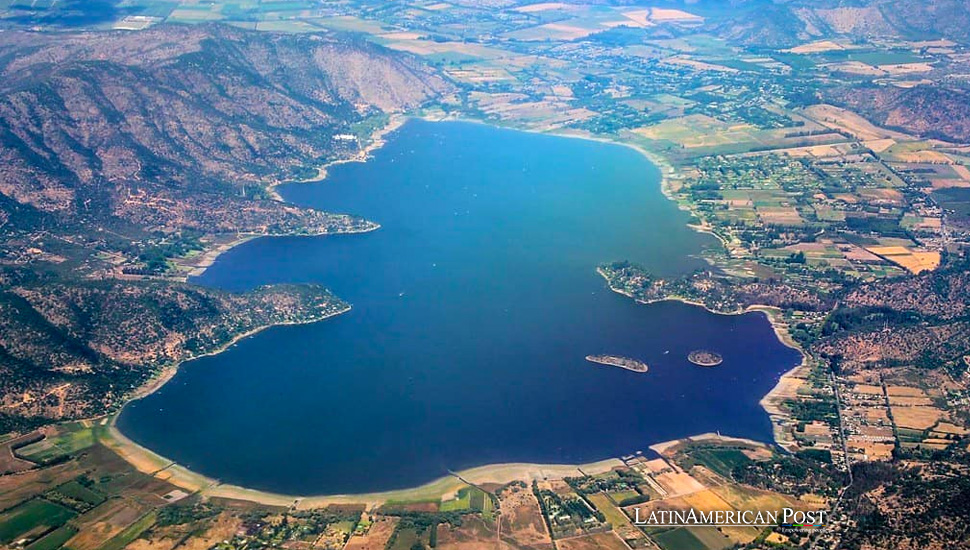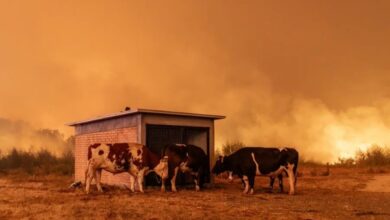Greenpeace Campaigns for Urban Wetland Status for Chile’s Aculeo Lagoon to Protect Biodiversity

Greenpeace advocates for the designation of Aculeo Lagoon, near Santiago, as an urban wetland, highlighting the urgent need for legal protection to preserve its revived ecosystem and biodiversity amid challenges like drought and unregulated urban expansion.
Preserving Aculeo Lagoon: Greenpeace’s Environmental Activism
In a vivid demonstration of environmental activism, Greenpeace recently launched a campaign to secure urban wetland status for Aculeo Lagoon and its surrounding streams, Pintué and Santa Marta, approximately 70 kilometers from Santiago in Chile’s Metropolitan Region. The initiative was symbolized by the deployment of a five-meter floating banner across the water’s surface, a plea for legal measures to safeguard this vital ecosystem, which, after nearly vanishing due to prolonged drought, was rejuvenated following the heavy rains of 2023.
This peaceful protest aimed to draw the attention of authorities, particularly the Ministry of the Environment, urging them to recognize the lagoon as an urban wetland. This designation is seen as essential for protecting the area’s rich biodiversity. “By declaring this lagoon an urban wetland, we can ensure its protection and that of the diverse life it supports,” stated a volunteer from the international organization, emphasizing the action’s goal.
Aculeo Lagoon, a cherished recreational destination in the heart of Chile, provides critical ecosystem services. It’s a haven for 102 bird species, serving as a vital stopover for migratory birds seeking refuge, food, rest, and breeding grounds. Notable species include the Cocoi Heron, the Silvery Grebe, and the Black-necked Swan. “This area not only offers a habitat for a wide range of species but also delivers essential environmental benefits such as climate regulation, water purification, and spaces for recreation and nature connection,” explained Dominique Charlin, a veterinarian and biodiversity specialist with Greenpeace.
Aculeo Lagoon plays a significant role in the local climate and water purification, demonstrating the interconnectedness of natural habitats and their broader environmental impacts. “The morning mist rising from the lagoon helps maintain humidity and balance the area’s temperature, supporting diverse forest ecosystems nearby,” noted Silvana Espinosa, a geographer and spokesperson for Greenpeace.
Regional Struggles: Urban Wetlands Across Latin America
The push to officially recognize Aculeo Lagoon as an urban wetland is part of a broader struggle across Latin America, where wetlands face urban development, pollution, and climate change threats. Urban wetlands in Chile alone cover over 11,000 hectares across 60 municipalities, showcasing the country’s rich biodiversity and the critical need for protective measures. These naturally occurring or artificially established ecosystems are crucial for their water purification capabilities, climate regulation, and recreational opportunities, especially within urban limits.
However, Chile is expected to face a challenge. Across Latin America, from the mangroves of Brazil to the high-altitude wetlands in Colombia and the Pantanal, one of the world’s largest freshwater wetland systems shared by Brazil, Bolivia, and Paraguay, rapid urbanization and environmental neglect pose significant risks. These ecosystems are vital for the survival of countless species, including humans, and serve as a buffer against climate change by sequestering carbon, regulating water flows, and reducing flood risks.
Also read: Rising Flames, Warming Planet: Chile’s Deadly Wildfires Signal a Harsher Future for Latin America
The campaign by Greenpeace in Chile underscores a regional imperative: to recognize and protect urban wetlands as biodiversity hotspots and natural climate solutions. It highlights the urgent need for action across Latin America to safeguard these ecosystems from the encroaching threats of development and degradation. As countries grapple with balancing growth and environmental preservation, the fate of places like Aculeo Lagoon is a poignant reminder of what’s at stake.




